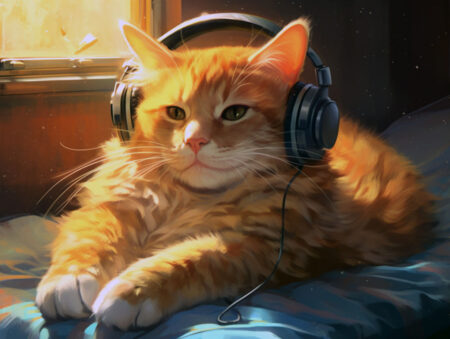Have you ever wondered if your feline friend has a taste for specific music genres? Just like humans, cats can indeed have preferences when it comes to music. But, what type of music do cats enjoy the most?
Let’s explore this fascinating world of feline musical tastes.
What Research Shows
Research has shown that cats are more responsive to music that incorporates frequencies and tempos similar to those found in their natural environment. This means that cats might not necessarily prefer a specific genre, but rather, music that mimics the sounds they would encounter in their daily lives.
A study conducted by researchers at the University of Wisconsin, Madison, and the University of Maryland revealed that cats showed a preference for music that was created specifically for them, with frequencies and tempos similar to those found in their natural communication.
Interestingly, the same study found that cats were largely indifferent to human music. This is likely due to the fact that human music is typically composed with human listeners in mind, and may not cater to the unique auditory preferences of our feline companions.
What Cat Owners Observe

That said, some anecdotal evidence suggests that certain cats might enjoy specific genres of human music. For example, some cat owners have reported that their pets seem to be fond of classical music or soft, soothing tunes.
Another factor influencing a cat’s preference for music is its personality. Just as humans have varying tastes in music, cats too might have unique preferences based on their own temperament and experiences.
A more adventurous cat might be intrigued by lively, upbeat tunes, while a shy or anxious cat might prefer softer, more calming melodies.
Remember that, while some cats may enjoy certain types of music, others might be indifferent or even averse to it.
As a responsible pet owner, observe your cat’s behavior and reactions when exposing them to music. If your cat seems stressed or uncomfortable, it’s best to turn off the music and allow them to enjoy their environment in peace.
Summary
While cats might not have a specific preference for a particular music genre, they seem to enjoy music that reflects the frequencies and tempos in their natural environment.
As a cat owner, be attentive to your cat’s reactions and preferences, ensuring their comfort and happiness as they explore the world of music with you.
So, the next time you’re about to hit play on your favorite playlist, don’t forget to consider your feline companion’s musical tastes as well!
How Music for Cats Works (Video)
10 Related Questions Concerning Cats and Music
1. How does music affect a cat’s mood and behavior?
Music can influence a cat’s mood and behavior by either calming or stimulating them, depending on the type of music played. Soothing tunes may help cats relax, while more upbeat music could make them more playful and active. However, individual cats may respond differently based on their unique personalities and preferences.
2. Can playing music for cats reduce stress and anxiety?
Playing music for cats can indeed reduce stress and anxiety, particularly if the music is tailored to their auditory preferences. Soothing melodies and cat-specific music, which incorporate familiar frequencies and tempos, can help create a more comfortable environment, promoting relaxation and reducing anxiety in cats.
3. How do frequency and tempo play a role in cats’ music preferences?
Frequency and tempo play a significant role in cats’ music preferences, as they tend to be more attracted to sounds that resemble their natural environment or communication patterns. Cats usually prefer music with frequencies and tempos similar to those found in their vocalizations, such as purring or meowing, which may explain their affinity for cat-specific music.
4. Are some cat breeds more responsive to music than others?
While there isn’t substantial research to suggest that some cat breeds are more responsive to music than others, individual cats’ responsiveness may vary based on their unique personalities, experiences, and environments. It’s important to observe your cat’s reactions to different types of music to understand their specific preferences.
5. How can I create a cat-friendly playlist for my feline friend?
To create a cat-friendly playlist, focus on incorporating soothing tunes and cat-specific music that mimic the frequencies and tempos found in feline vocalizations. Observe your cat’s reactions to different music styles and adjust the playlist to suit their preferences and ensure their comfort.
6. What are the key elements of music composed specifically for cats?
Key elements of music composed specifically for cats include frequencies and tempos that resemble those found in their natural environment and communication patterns. Such music often incorporates purring-like sounds, mimics birdsong, or features higher-pitched melodies that cater to feline auditory preferences.
7. Can exposure to certain music genres improve a cat’s quality of life?
Exposure to certain music genres, particularly soothing or cat-specific music, can potentially improve a cat’s quality of life by reducing stress and anxiety, promoting relaxation, and providing mental stimulation. However, monitor your cat’s reactions and adjust the music according to their preferences and comfort level.
8. Do cats respond differently to live music versus recorded music?
There is limited research on cats’ responses to live music versus recorded music, but individual cats may react differently based on factors such as volume, familiarity, and the presence of humans or other animals. Observing your cat’s reactions to both types of music can provide insight into their preferences.
9. How do cats’ auditory systems influence their music preferences?
Cats’ auditory systems influence their music preferences as they are sensitive to specific frequencies and tempos found in their natural environment and communication patterns. This sensitivity plays a significant role in their attraction to certain types of music, particularly those that mimic feline vocalizations or environmental sounds.
10. Are there any potential negative effects of exposing cats to music?
Potential negative effects of exposing cats to music include stress, anxiety, or discomfort if the music is too loud, unfamiliar, or not in line with their auditory preferences. Monitor your cat’s reactions to music and adjust the volume, style, or duration to ensure their well-being and comfort.
"In ancient times cats were worshipped as gods; they have not forgotten this."
-- Terry Pratchett





